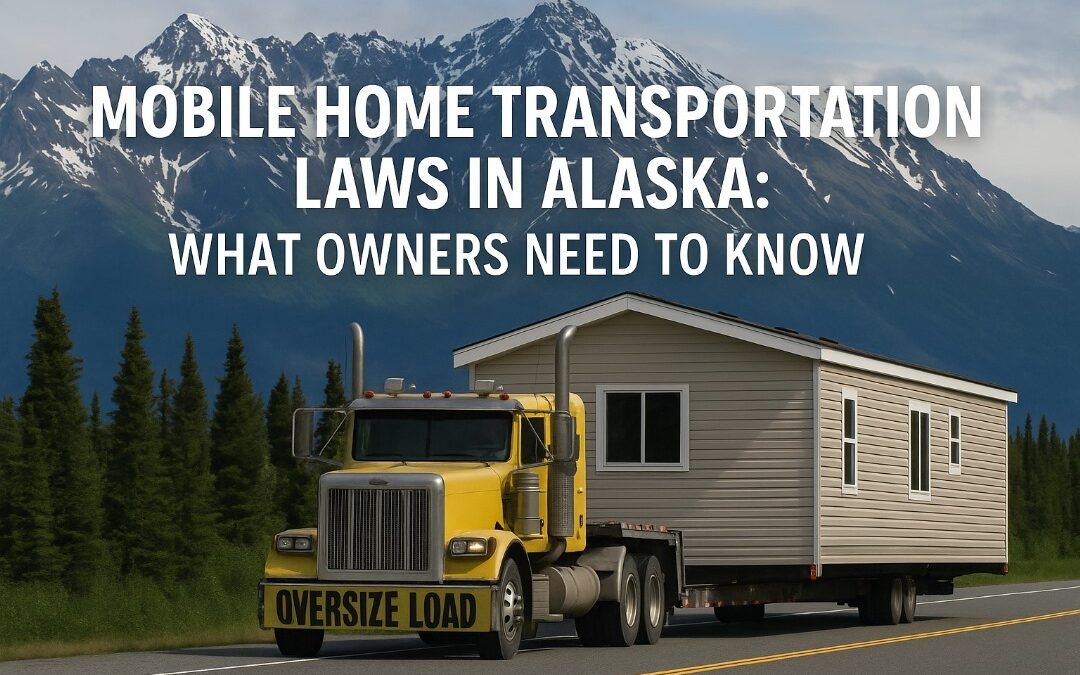
Mobile Home Transportation Laws in Alaska: What Owners Need to Know
Relocating a mobile home in Alaska is not as simple as hooking it up to a truck and hitting the road. Whether you live in Fairbanks, Anchorage, or Juneau, the transportation of manufactured and mobile homes is heavily regulated. State and borough governments have strict guidelines to ensure safety on Alaska’s highways and compliance with Department of Transportation (DOT) rules. This detailed guide will explain the essential transportation laws, required permits, and what homeowners must know before moving a mobile home in Alaska.
For homeowners seeking expert moving help, Trailer House Movers Near Me offers professional services tailored to Alaska’s unique conditions.
Why Transportation Laws Matter in Alaska
Alaska’s geography and weather create unique challenges for moving oversized loads like mobile homes. Narrow mountain roads, icy conditions, and remote rural routes require careful planning. The state has enacted specific transportation laws to:
- Protect road safety for other drivers
- Minimize infrastructure damage
- Ensure homes are moved with structural integrity
These regulations apply throughout Fairbanks North Star Borough, Anchorage Borough, and Juneau Borough, but local rules may also add extra requirements.
Alaska DOT Regulations for Mobile Home Moves
The Alaska Department of Transportation (DOT) regulates oversize and overweight loads, including manufactured homes. Here are the main requirements:
- Oversize Load Permits: A mobile home wider than 8.5 feet requires an oversize load permit.
- Escort Vehicles: Depending on the size of the home and the route, escort or pilot cars may be required.
- Weight Restrictions: Trucks and trailers must comply with Alaska’s maximum weight limits.
- Travel Restrictions: Some moves are restricted during peak traffic hours or unsafe weather conditions.
Violating these rules can result in fines, delays, or even damage to the home. To better understand what’s included in professional moving assistance, visit our services page.
Borough-Specific Rules
While state laws apply everywhere, individual boroughs may have additional rules:
- Fairbanks North Star Borough: Special permits may be required for local road usage.
- Anchorage Borough: Oversize loads may have limited travel times and restricted access through certain neighborhoods.
- Juneau Borough: Weather-related restrictions often apply, and ferry transport may be required for certain routes.
Always check with local authorities before scheduling your move.
Permit Requirements for Mobile Home Transportation
Before moving your mobile home, you’ll need to secure the proper permits. These typically include:
- State Oversize Load Permit: Required for any home exceeding standard width or height.
- Local Permits: Some boroughs require additional documentation.
- Temporary Road Use Permits: If moving through construction zones or restricted areas.
Your moving company should assist with acquiring these permits, but as the homeowner, you are ultimately responsible for ensuring compliance.
The Role of Professional Movers
Attempting to move a mobile home without professional help is risky and often illegal. Licensed mobile home movers in Alaska:
- Handle all required permits
- Provide escort vehicles if needed
- Ensure compliance with both DOT and borough laws
- Use specialized equipment for safe transport
Hiring a professional ensures peace of mind and protects you from fines or accidents. Start planning today by reaching out through our contact page.
Insurance and Liability
Alaska law requires movers to carry liability insurance when transporting oversized loads. Homeowners should also verify whether their homeowner’s insurance covers relocation. Without proper coverage, you could be held financially responsible for accidents or damages.
Cost Implications of Compliance
Following Alaska’s transportation laws can increase moving costs due to:
- Permit fees
- Escort vehicle charges
- Seasonal restrictions requiring rescheduling
However, compliance avoids costly fines and ensures your mobile home arrives safely.
Common Mistakes to Avoid
- Skipping Permits: Moving without a permit can result in hefty fines.
- Hiring Unlicensed Movers: Only licensed professionals can legally move mobile homes in Alaska.
- Ignoring Borough Rules: Local regulations may be stricter than state laws.
- Overlooking Insurance: Failing to confirm insurance coverage can leave you financially exposed.
Steps for a Legal Mobile Home Move in Alaska
- Contact a licensed mobile home mover.
- Apply for all necessary state and borough permits.
- Schedule your move within permitted hours and seasons.
- Ensure escort vehicles are arranged if required.
- Verify insurance coverage before the move.
- Conduct a final compliance check with your mover.
Final Thoughts
Moving a mobile home in Alaska requires more than just logistics—it requires legal compliance. From securing permits to following borough-specific rules, every step must align with state and local laws. Whether you’re in Fairbanks, Anchorage, or Juneau, partnering with an experienced, licensed mover ensures your relocation is safe, legal, and stress-free.
If you’re planning to move a mobile home in Alaska, consult professionals who understand the complexities of transportation laws. For expert help, check our services or get in touch directly through our contact page to discuss your moving needs.
